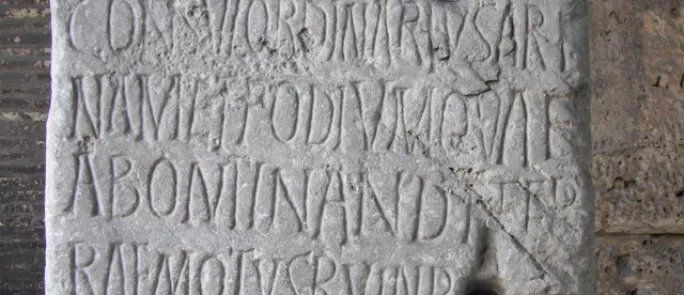‘Eheu! Latin is as relevant now as it was back in Caecilius’ time’
Edmond Wax, who will begin an undergraduate degree at Queens’ College, Cambridge, in French and Spanish this autumn, writes:
It is ridiculous that so much of the debate about teaching Latin revolves around its usefulness as a subject. Why, the argument goes, condemn your child to hundreds of hours in a classroom with a balding eccentric, poring over the conjugations and irregular verbs of a dead language?
Having just emerged from secondary school myself, I am convinced that using usefulness as a yardstick for a subject’s inherent worth is a very short-sighted thing to do. Most of what I dragged my brain through for my maths GCSE will never help me, unless I find a job solving quadratic equations. And all I have gleaned from chemistry is that blast furnaces are hot and safety specs must be worn at all times. I am sure most people secretly harbour the view that once you can do the basics (multiply, add, etc) you are basically sorted.
But school isn’t just a place for training kids to become lawyers or accountants, so usefulness should fly out of the window when we choose our subjects. Those who reject Latin as unpractical should logically be in favour of teaching kids how to survive when their benefits are slashed or how to make dinner for six from one egg, one mushroom and a mouldy stick of ginger. Now that would be useful.
Nevertheless, even if we are to take usefulness into account, I believe Latin still deserves to be up there scrapping for position with heavyweights such as maths and physics. Writing in The Daily Telegraph in 2010 Boris Johnson called Latin “a giant universal spanner for other languages” and he’s jolly well right. When I begin my degree in French and Spanish in October, I know that the four years I spent building up a Latin vocabulary and studying the grammar of the language will help me to recognise new words that I come across and unpick unfamiliar structures.
Just as mathematicians carp on about the brain-bending mental discipline that their subject instils in its students, Latin encourages methodical thinking and puzzle-solving skills. It doesn’t matter that I can’t pop off to the forum for a quick chat with a real life Roman called Caecilius. Translating a Latin sentence and understanding why this or that declension was used is rewarding in itself and I learned the brick-by-brick approach I needed to take on the study of modern foreign languages up to A-level.
Whatever you make of his other policies, Michael Gove is right to promote the teaching of classics in state schools. Last month, he announced a new project led by an Oxford don to train non-specialist teachers in how to teach Classics in state secondary schools and said that he thought that it was “wrong” that most university places for Classics are going to independent school students merely because they are the only ones who learn it.
The education secretary is right.
Turning away from teaching Latin and Greek for having nothing to offer in the 21st century is not only incorrect but narrow-mindedly implies that what should interest young people nowadays is what is going to help them make money in the future.
Keep reading for just £1 per month
You've reached your limit of free articles this month. Subscribe for £1 per month for three months and get:
- Unlimited access to all Tes magazine content
- Exclusive subscriber-only stories
- Award-winning email newsletters




